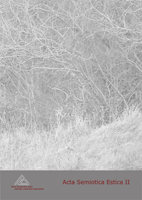Meie kategooria konstrueerimine Nõukogude Eesti poliitilises retoorikas 1940. aasta "juunisündmustest" kuni 1941. aasta juulini
The Construction of the Concept of We in Political Rhetoric of Soviet Estonia in 1940-1941
Author(s): Andreas VentselSubject(s): Semiotics / Semiology
Published by: Eesti Semiootika Selts
Keywords: soviet; rhetoric; pragmatics; ideology; identity; psychology of persuasion; nõukogude; retoorika; pragmaatika; ideoloogia; identiteet; veenmispsühholoogia
Summary/Abstract: The years 1940-1941 mark one of the most crucial periods in Estonian recent history. The establishment of Soviet power was not carried out using only violent means. The power had to legitimate itself and to justify the change of the situation to the masses. Here, the basis of legitimisation — the construction of we or people or people's will — obtains primary importance. This basic concept of cultural identity, we, together with the second member of opposition, they, forms the central axis of cultural description that defines and delimits the relationship between the self-description of culture (organised space) and another culture (unorganised space). The material for the analysis consists of speeches of the new political elite of the time (Vares-Barbarus, Lauristin, Kruus, etc.). The first year of Soviet power in Estonia can be roughly divided into two periods: the period in 1940 from June 21st to "July elections", and the period since "July elections" of 1940 until July 1941. In political rhetoric, the new political elite tried to create a monolithic subject, a unity between themselves and people (people's will) by emphasizing activity and freedom of self-determination. However, since "July elections", especially since the "acceptance" of the Soviet Republic of Estonia into Soviet Union, there can be detected a change in the we-concept, a transition from an active subject to merely a passive recipient. From that time on people's will was envisaged as entirely determined by Marxist-Leninist ideology and the Party. From the viewpoint of the pragmatic value of speeches, the transition was manifested in depicting the opposition of we-they through oppositions new-old, right-wrong. Rhetoric devices characterizing these oppositions were widely used in speeches and the description of reality was therefore entirely emotionally evaluative.
Journal: Acta Semiotica Estica
- Issue Year: 2005
- Issue No: 2
- Page Range: 082-098
- Page Count: 17
- Language: Estonian

